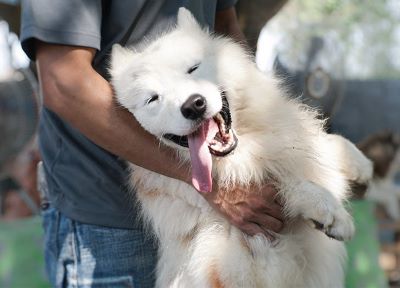Neutering is a simple surgery that vets do to remove a male dog’s testicles or a female dog’s ovaries and uterus.
It has a few essential reasons like controlling the population of dogs and keeping them healthy. This surgery is helpful for every responsible pet owner.

If you’re thinking of getting a dog, it’s good to know the advantages of neutering.
By having your dog neutered, you contribute to controlling the population of stray and unwanted dogs, which can help minimize the burden on animal shelters.
A University of Georgia study, based on the medical records of more than 70,000 animal patients, found that the life expectancy of neutered male dogs was longer and that of spayed female dogs was longer [1]
By preventing the risk of getting certain types of cancer and reproductive problems, neutering helps dogs in improving their long-term health.
Before selecting whether to neuter your dog, it’s crucial to speak with the vet and discuss concerns.
Recommended Timeline for Recovery After Dog Neutering
It is important to provide proper care and allow sufficient time for your pet to recover. Which may vary depending on the individual dog, followings are some of the general recommendations [2]:
- Day of Surgery: After your dog receives anesthesia, it may feel tired and confused. It’s important to let them rest in a calm and cozy place. Follow any instructions given by your vet about feeding and providing medication to your dog.
- First 24 Hours: Keep your dog in a quiet area to prevent them from being too active. Make sure they have water but don’t feed them for the first 12-24 hours after surgery. Follow the vet’s instructions for giving pain medications or antibiotics and watch for any problems with the incision site, reporting any concerns to the vet.
- Days 2-7: To keep your dog calm and prevent strenuous activities, consider using a cone or special clothing to prevent licking or biting the surgery area. Follow your vet’s guidance on gradually reintroducing small meals and administering prescribed medications, while staying attentive for signs of infection and promptly notifying your vet of any concerning changes.
- Days 8-14: Keep an eye on your dog’s incision to make sure it heals well. Avoid too much activity. Follow any instructions about removing stitches, if needed. If you notice any signs of infection, tell your vet.
- Days 14 and Beyond: Your dog should be fine now, but keep checking the cut and how your dog acts. Do more things with your dog as your vet says. Feed and play with your dog like before. Talk to your vet if you have any questions or problems
Risks of Walking Too Soon
The health of your dog after neutering may suffer if you walk them too soon. Before allowing your dog to participate in any physically demanding activities, including walks, it’s crucial to give them ample time to recover.
You can contribute to protecting their well-being and lowering the likelihood of complications by giving them a sufficient recovery period.
A higher chance of infection or rash at the surgical site can result from excessive exercise right after surgery.
It’s important to follow your vet’s advice and wait until your dog is fully recovered before starting walks or any energetic exercises in order to avoid these possible issues.

The ideal healing period for your particular dog might be advised by the vet.
Always see your veterinarian if you have any worries or queries regarding how your dog will heal following surgery.
They are the finest resource for professional medical counsel and may offer detailed instructions based on the health of your dog.
By asking for advice, you can make sure your dog is given the right care and attention while they are recovering.
Helping to Regain the Strength After Neutering
Now that you are aware of their recovery time and the concerned risks, let’s explore how you can help them.
It is important to create a quiet and comfortable environment for them. Limit their physical activity and avoid activities like jumping or running, as these can stress their healing body.
Consider using a cone or specific clothing to prevent them from licking or biting the surgery area, which can pause the healing process.
Providing a quiet and cozy space for rest will contribute to their overall well-being.
In addition to that, it is crucial to follow your vet’s instructions for medication and diet.

Your vet may recommend gradually reintroducing small meals. Keeping a consistent feeding schedule and providing a balanced diet with best dog food will aid in their healing process.
Observing the incision site is essential for detecting any signs of infection or complications. Watch for redness, swelling, or unusual discharge from the surgery area.
If you notice anything concerning, please inform your vet.
Regular check-ups with the vet can also help track the progress of your dog’s recovery and address any questions or concerns you may have.
FAQs
How Many Days After Neutering Can I Walk My Dog?
Vets advise you to let your dog rest for up to 48 hours after neutering. Light short and slow walks just for them to do their business are fine until you bring your dog in for their 3-day check-up.
Can I Cuddle My Dog After Neutering?
Keeping your dog calm after surgery just takes some planning and a little bit of creativity. You can help make their recovery period easier by keeping them busy with a few low-impact activities, fun games, and of course lots of cuddles.
What to Do if Your Dog Licks His Neuter Incision?
If your dog persists in licking or chewing at the incision, he may need to wear an Elizabethan collar (cone) to prevent this behavior.
Do Dogs Feel Better After Being Neutered?
While male dogs who are neutered do experience an increase in aggressive behaviors right after the procedure, neutering can make them much less aggressive over time. In fact, neutering has been proven to create a much happier and calmer male dog over time.
Conclusion
After neutering the time of recovery may vary from dog to dog.
It is essential to consider your pet’s general health and improvement in recovery before making any decision. It is vital to follow the recommended aftercare instructions, whether it takes three days or longer.
You can continue your dog’s healing process by allowing them to slowly restart their regular walking schedule and revive their enjoyment of outings.
Reference:
- Hoffman, J. A., Creevy, K. E., & Promislow, D. E. L. (2013b). Reproductive Capability Is Associated with Lifespan and Cause of Death in Companion Dogs.- PLOS ONE
- Spay/neuter post-surgical care and recovery instructions. (n.d.)- Animal Humane Society.

Patricia is a guardian to an exotic shorthair cat named Suz. She’s a professional cat trainer and behaviorist. She has expertise in writing on feline behavior, house training, and tips & tricks including product reviews of related products.

